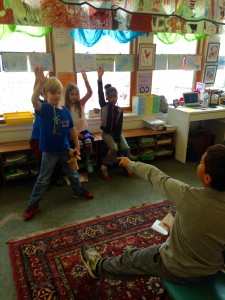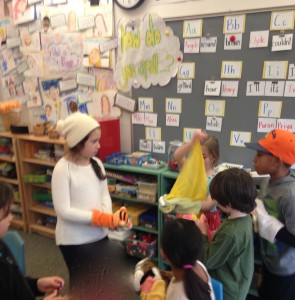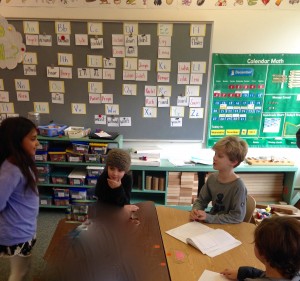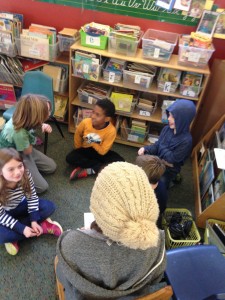Power in the Classroom, School, and Community
Last week we began our study of Power in the Classroom, School, and Community. In the 2/3, students brainstormed times they felt powerful at Miquon, and times they felt powerless. Some students volunteered and said they often feel powerful when younger students ask them for help, or when they move up in a reading level. We even heard that having Choice Time makes them feel powerful because they can build forts, and invent games to play in the woods near the creek (known as Monkeyland). Some continued to talk about when they feel powerless, describing moments when the teachers don’t ask for children’s input, or when they suggest playing something with friends and some aren’t interested in joining in.
 After hearing different situations about times students may have felt powerful/less in school, they role played what those situations looked like and how power could have shifted in the moment. For example, one group played out a scene where someone was excluded during lunch time and they had to navigate how they could have empowered one another differently. Another group performed a skit involving a teacher who was working with one student and wasn’t able to help another in need. This group showed what the teacher could have done to make the other student feel valued and heard, and, therefore powerful.
After hearing different situations about times students may have felt powerful/less in school, they role played what those situations looked like and how power could have shifted in the moment. For example, one group played out a scene where someone was excluded during lunch time and they had to navigate how they could have empowered one another differently. Another group performed a skit involving a teacher who was working with one student and wasn’t able to help another in need. This group showed what the teacher could have done to make the other student feel valued and heard, and, therefore powerful.


We reflected together and came to the conclusion that everyone has times when they feel powerful and powerless, no matter if they are a child or an adult. This activity continued through the following day when we brainstormed all of the stakeholders at Miquon. The list ranged from students, parents, teachers, the principal, office staff, all the way to the founders of Miquon, known as “The Two Peggy’s”. Students engaged in a debate about who they thought was the most powerful. One student said, “the parents are the most powerful because they pay for us to be here, and without money the school couldn’t operate.” Another responded, “but the students must be the most powerful because without kids here no one has a place to work.” Another suggested, “No, no, it’s the two Peggy’s! Without them, Miquon wouldn’t be here!” And then we heard,
“maybe EVERYONE at Miquon has the most power, it just depends on their role and the situation they are placed in.”
– Evy H.

It was a wonderful moment of discovery for the students and for the teachers. We could almost hear the “aha” that arose out of our debate. The 2/3 will continue their study of power as they role-play, create, debate, and explore how power exists in our communities.
– Rachel Elin-Saintine, 2/3 Lead Teacher